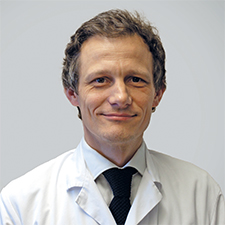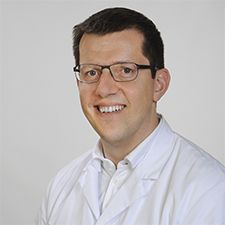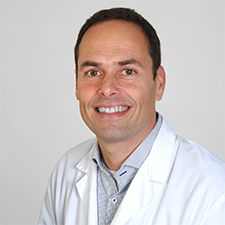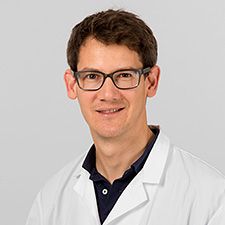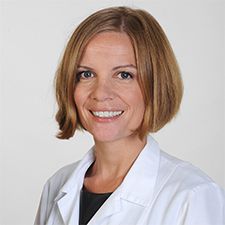The diversity of these diseases and their numerous new treatment options require corresponding experience. For this reason, we treat lymphoma and myeloma patients several times a week in our special consultation hours. We work closely with our highly specialized pathology department to correctly diagnose the diseases. The test results are discussed at our interdisciplinary leukemia, lymphoma and myeloma (LLMZ) tumor board in order to determine the best therapy in each case.
Aggressive lymphomas
Lymphoma is a disease caused by malignantly altered lymphocytes, the cells that are responsible for the targeted defense against pathogens. Lymphomas that progress rapidly are called aggressive lymphomas. There are numerous subgroups of aggressive lymphomas, the majority of which originate from B lymphocytes. In Europe there are around 10 new cases per 100,000 inhabitants, in Switzerland around 800 new cases per year. Diffuse large B-cell lymphoma is one of the most common aggressive lymphomas.
Aggressive lymphomas can quickly impair the function of the affected organs due to their rapid growth and, if left untreated, can lead to complications within a few days or weeks, meaning that close interdisciplinary cooperation between specialists from different disciplines is crucial for rapid diagnosis and treatment. The rapidly dividing cells of an aggressive lymphoma react very sensitively to treatment, the spectrum of which includes antibody and chemotherapy, radiation, targeted drugs and, under certain circumstances, autologous and allogeneic transplantation of blood stem cells or cell therapy (CAR-T cells). The choice of therapy depends on the stage of the disease and the type of lymphoma, as well as on the patient’s state of health and age. The treatment of aggressive lymphomas is becoming increasingly complex and new and promising treatment concepts are becoming increasingly available in clinical trials.
Low malignant B-cell lymphomas
Low-malignant lymphomas are a collective term for a spectrum of malignant diseases of the lymphocytes that show a predominantly slow clinical course due to the low division rate of the degenerated lymphocytes. This includes various clinical pictures such as follicular lymphoma, marginal zone lymphoma, lymphoplasmocytic lymphoma and hairy cell leukemia. The slow progression of these diseases often allows a wait-and-see approach with regular optimal care by experienced specialists in the treatment of these diseases in order to determine the optimal time for therapy.
The therapeutic spectrum includes:
- Modern chemotherapies according to current international standards, alone or usually in combination with targeted immunotherapies using monoclonal antibodies.
- Targeted drug therapies that use disease-specific changes as therapeutic targets.
- In the rare case of transition to an aggressive form, the entire therapeutic spectrum of aggressive lymphomas including autologous and allogeneic stem cell transplantation.
Hodgkin's lymphoma
Hodgkin’s lymphomas are malignant diseases of certain cells of the immune system. The disease is usually characterized by long-lasting swelling of the lymph nodes. Other symptoms include weight loss, night sweats and unexplained fever episodes. The diagnosis is confirmed by examining tissue from a removed lymph node. After pathological confirmation of the diagnosis, further examinations are then necessary to assess the spread of the lymphoma in the body (PET-CT).
The initial therapy depends on the age of the patient and in particular on the stage (spread in the body) of the disease. In addition to chemotherapy and antibody therapy, radiotherapy is also used. Even though Hodgkin’s lymphoma is now considered to be well treatable and can be cured in most cases, the disease relapses in some cases. In this case, further treatment options are available. With the use of high-dose chemotherapy and antibody therapies as well as a stem cell transplant (usually with the patient’s own stem cells and possibly also with foreign stem cells), a cure is often possible even after a relapse.
We offer the entire spectrum of outpatient and inpatient diagnostics and therapy for Hodgkin’s lymphoma. We take an interdisciplinary approach to all patients, involving colleagues from other specialist disciplines, and try to further improve treatment by participating in studies.
CNS lymphomas
If a lymphoma only affects the central nervous system (CNS), the disease is referred to as primary CNS lymphoma. As a rule, these are fast-growing and aggressive lymphomas, which are usually derived from B cells, a subspecies of lymphocytes. CNS lymphomas are very rare and account for only about 1-2% of all lymphoma cases.
Patients with these diseases usually present with neurological symptoms caused by the location of the lymphoma in the CNS. Typical symptoms are paralysis, nausea, vomiting, visual disturbances and personality changes, as well as rare epileptic seizures.
A CNS lymphoma is suspected by radiological imaging using CT, or better an MRI. A subsequent biopsy then leads to a histological diagnosis. Furthermore, examinations are necessary to rule out the spread of the lymphoma outside the CNS (e.g. PET-CT and bone marrow puncture).
Depending on the patient’s age, treatment is then given, which usually consists of combined immunochemotherapy, high-dose chemotherapy for younger patients and radiotherapy if necessary. The intensity of the chemotherapy depends, among other things, on the age of the person affected.
The diagnosis and treatment of CNS lymphoma at the USZ is carried out on an interdisciplinary basis in close cooperation between the Departments of Hematology and Medical Oncology, Neurology, Neurosurgery and Radiation Oncology as well as the Departments of Neuropathology and Pathology.
We offer the entire spectrum of therapy, including high-dose chemotherapy with subsequent replacement of autologous stem cells. In addition to standard therapy, we are trying to further improve the treatment of these rare lymphomas by participating in clinical trials.
